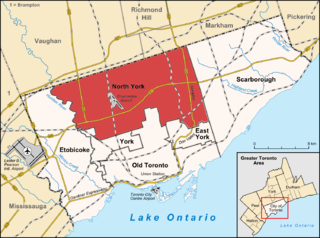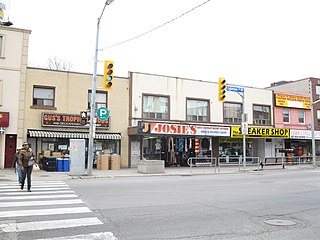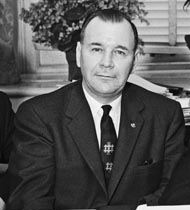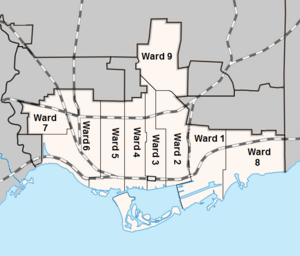
North York is a former township and city and is now one of the six administrative districts of Toronto, Ontario, Canada. It is located in the northern area of Toronto, centred around Yonge Street, north of Ontario Highway 401. It is bounded by York Region to the north at Steeles Avenue, on the west by the Humber River, on the east by Victoria Park Avenue. Its southern boundary corresponds to the northern boundaries of the former municipalities of Toronto: York, Old Toronto and East York. As of the 2016 Census, the district has a population of 644,685.

York is a district and former city within Toronto, Ontario, Canada. It is located northwest of Old Toronto, southwest of North York and east of the Humber River.

The Chairman of the Municipality of Metropolitan Toronto or Metro Chairman was the regional chair of Metropolitan Toronto, Ontario, Canada, and the most senior political figure in the municipality. The Metro Chairman was elected by the members of Metropolitan Toronto Council.
Municipal elections were held in Toronto, Ontario, Canada, on December 5, 1966. The elections were the first in Toronto after its merger with several smaller suburban communities on January 1, 1967. Forest Hill and Swansea were annexed by the City of Toronto, Leaside was merged with the Township of East York to become the Borough of East York. Weston was combined with the Township of York to form the Borough of York. The Village of Long Branch and the towns of Mimico and New Toronto were merged with the Township of Etobicoke to form the Borough of Etobicoke.
Municipal elections were held in Toronto, Ontario, Canada, on December 7, 1964. Incumbent mayor Philip Givens defeated former mayor Allan Lamport.
The Board of Control of Toronto, Ontario, Canada, was a part of its municipal government until it was abolished in 1969. It served as the executive committee of the Toronto City Council. When it was initially created in 1896 by mandate of the provincial government, it consisted of three Controllers appointed from and by the aldermen, and presided over by the Mayor of Toronto. Beginning in 1904, the Board of Control was directly elected by the city's electorate and consisted of four Controllers, presided over by the Mayor. Each voter could vote for up to four candidates, and the four with the most votes were elected. By tradition the controller who received the most votes would get the powerful budget chief position.
Municipal elections were held in Toronto, Ontario, Canada, on December 5, 1960. Six-year incumbent mayor Nathan Phillips was challenged by former mayor Allan Lamport and Controller Jean Newman. Phillips was returned to office.
Municipal elections were held in Toronto, Ontario, Canada, on December 1, 1958. Four year incumbent mayor Nathan Phillips won reelection against Controller Ford Brand, who was supported by the Co-operative Commonwealth Federation and Toronto Labour Council, and Controller Joseph Cornish.
Municipal elections were held in Toronto, Ontario, Canada, on December 3, 1956. Incumbent mayor Nathan Phillips was easily reelected. Jean Newman became the first woman elected to the Board of Control, and topped the poll to become budget chief.
Municipal elections were held in Toronto, Ontario, Canada, on December 5, 1955. Incumbent mayor Nathan Phillips, elected a year earlier, was easily reelected, defeating Controller Roy E. Belyea and Trotskyist Ross Dowson.
Municipal elections were held in Toronto, Ontario, Canada, on December 6, 1954. Incumbent mayor Leslie Saunders was defeated by Nathan Phillips in a close contest.
Municipal elections were held in Toronto, Ontario, Canada, on December 7, 1953. Incumbent mayor Allan Lamport won an unexpectedly close race against school board chairman Arthur J. Brown. This election was the first for councils in the municipality of Metropolitan Toronto which would be created on January 1, 1954 and was composed of 14 municipalities: the City of Toronto, the towns of New Toronto, Mimico, Weston and Leaside; the villages of Long Branch, Swansea and Forest Hill, and the townships of Etobicoke, York, North York, East York, and Scarborough.
Municipal elections were held in Toronto, Ontario, Canada, on December 1, 1952. Incumbent mayor Allan Lamport easily won against former alderman Nathan Phillips.

Ford Brand was a Canadian politician who was a one-time rival to Toronto mayor Nathan Phillips. Ford had a seat on the Toronto Board of Control, the municipality's executive body, from 1951 to 1958 and also an inaugural member of the Metropolitan Toronto Council from the 1954 election until 1958. In the 1958 Toronto municipal election he challenged incumbent mayor Nathan Phillips, but lost by 20,000 votes. He then served two five-year terms as a member of the Toronto Transit Commission's board before retiring in 1970.
Norman Goodhead was Reeve of the Township of North York, Ontario from 1959 to 1964 and was twice a leading candidate to be Chairman of Metropolitan Toronto.
Municipal elections were held in Toronto, Ontario, Canada, on January 1, 1900. Incumbent Mayor of Toronto John Shaw chose not to stand for a third term. Former Alderman Ernest A. Macdonald was elected mayor after having been unsuccessful on three previous attempts. He defeated Member of Parliament Edward Frederick Clarke, who was also a former mayor, and Second Ward Alderman John Hallam.
Jack Mould (1921-1990) was the last Reeve of York Township and the first mayor of the borough of York, one of six municipalities that made up Metropolitan Toronto.






